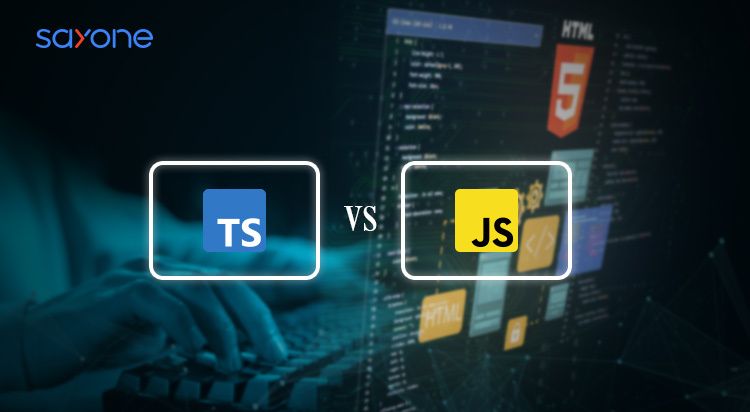
Subscribe to our Blog
We're committed to your privacy. SayOne uses the information you provide to us to contact you about our relevant content, products, and services. check out our privacy policy.

Real PradAugust 28, 20249 min read

Generating table of contents...
TypeScript and JavaScript are two programming languages that have been pitted against each other in the developer community.
While JavaScript has been the go-to language for web development, TypeScript has emerged as a strong contender, offering a more structured and maintainable alternative. But what sets them apart?
TypeScript is often touted as a superset of JavaScript, and for good reason. It builds upon the foundation of JavaScript, adding features like static typing, interfaces, and generics. This means that developers can write more robust and scalable code with fewer errors and bugs.
JavaScript is a dynamically typed language that has existed for decades. It's flexible and versatile, and a massive community of developers swears by it. But as projects grow in complexity, JavaScript's lack of structure and type safety can become a major liability.
So, when should you use TypeScript, and when should you stick with JavaScript?
This comprehensive comparison will explore the pros and cons of each language and help you decide which one is best for your next Project.
TypeScript offers several tangible benefits that can directly impact project efficiency and scalability, making it a worthwhile investment for business owners.
A study by Microsoft found that using TypeScript reduced the number of bugs in their codebase by 15%. Businesses can allocate more resources to feature development and innovation by minimizing the time spent on debugging.
Airbnb reported a significant reduction in the time it took for new engineers to get up to speed with their codebase after switching to TypeScript.
By making code easier to understand and maintain, businesses can reduce the onboarding time for new developers and improve team productivity.
A survey by the TypeScript team found that 70% of respondents reported improved collaboration among team members after adopting TypeScript.
By reducing technical debt and improving collaboration, businesses can ensure that their development teams are working efficiently and effectively.
TypeScript makes it easier to keep everything organized and bug-free as projects grow.
LinkedIn reported significantly reduced errors in their codebase after switching to TypeScript, which allowed them to scale their development team more efficiently.
By investing in TypeScript, businesses can ensure that their projects are scalable and maintainable over time.
JavaScript is a versatile and powerful programming language that offers numerous benefits to businesses, particularly in terms of user experience and cost-effectiveness.
When considering the adoption of TypeScript over JavaScript, business owners often look for tangible benefits that can impact their bottom line.
TypeScript reduces bugs and improves readability in team environments. This is achieved through its static typing system, which helps developers catch errors early and understand each other's code more easily. Online Statistics says that startups improved their codebase stability and reduced QA time by 40% after adopting TypeScript.
Companies using TypeScript can refactor code more easily, leading to faster feature delivery. This is because TypeScript's type system allows for more confident code changes, reducing the time spent on debugging and testing.
E-commerce platforms using TypeScript achieved a 25% faster time to market for new features, resulting in increased revenue growth.
TypeScript provides developers with advanced tooling and features that improve development efficiency, saving time and costs in the long run.
This includes better code completion, debugging tools, and the ability to use the latest JavaScript features while ensuring compatibility with older browsers. Businesses adopting TypeScript found up to 40% savings in debugging and maintenance costs over time.
Checkout 7 Best Java IDEs and Editors in 2024
Companies report up to 50% reduction in development costs due to improved workflow with TypeScript. A study indicates that TypeScript developers can be 30% more productive, leading to faster releases and improved revenue potential. This makes TypeScript a worthwhile investment for businesses looking to streamline their development processes and improve their bottom line.
JavaScript is a versatile and dynamic language that offers numerous benefits for businesses.
JavaScript is a language that offers numerous benefits for businesses. Here are some key advantages:
JavaScript enables developers to quickly iterate on projects, improving workflow efficiency during development. Its asynchronous nature allows for non-blocking code execution, which is particularly useful for applications requiring real-time updates.
Fintech startups used JavaScript to develop a real-time analytics dashboard, reducing development time by 30% and costs by 25% compared to using traditional server-side languages.
With frameworks like Node.js, JavaScript enables rapid application development and deployment. This is essential for businesses that need to adapt quickly to market changes or user demands.
Companies like Netflix have utilized JavaScript to improve their user interface for better performance and lower load times, resulting in a 20% increase in user engagement and a 15% increase in subscription rates.
JavaScript allows for full-stack development with the same language on both client and server sides, reducing the need for different teams and speeding up the development cycle.
For example, LinkedIn migrated its mobile app to JavaScript, improving load times and increasing user engagement. This migration also enabled LinkedIn to handle a 30% increase in traffic without additional infrastructure costs.
JavaScript is ideal for applications requiring real-time updates, such as chat applications or live notifications. Companies like eBay have implemented JavaScript extensively for real-time bidding applications, resulting in a more interactive and responsive platform that drives user retention.
eBay's real-time bidding system saw a 40% increase in user engagement and a 25% increase in sales within the first quarter of implementation.
When considering TypeScript and JavaScript for software development, it's important to understand their distinct features and how they can impact business decisions.
JavaScript is the primary language for web development, compatible with all major browsers and platforms. Its dynamic typing allows developers to write and iterate code quickly, which is beneficial for projects that require fast development and deployment.
JavaScript's ecosystem includes popular libraries and frameworks like React and Angular, which are supported by a large community offering extensive resources.
JavaScript's flexibility can lead to runtime errors that are difficult to debug, especially in larger applications. This can result in increased maintenance costs and potential delays, which are critical concerns for businesses focused on delivering reliable software.
TypeScript extends JavaScript by adding static typing, which helps identify errors early in development. This feature improves code reliability and maintainability, making managing large and complex codebases easier.
Fewer bugs and more predictable software behavior for businesses mean potentially reducing long-term maintenance costs.
Despite these benefits, TypeScript requires an initial learning curve for developers accustomed to JavaScript.
The additional compilation step can add complexity to the development process, which might require upfront investment to transition existing JavaScript codebases to TypeScript.
Business owners should consider their specific project needs when deciding whether to invest in TypeScript.
If the Project involves large-scale applications where maintainability and scalability are priorities, TypeScript's structured approach can be a valuable investment.
Its integration with modern development tools improves productivity, allowing teams to work more effectively and deliver features faster.
JavaScript's simplicity and flexibility might be more suitable for smaller projects or when speed is a priority.
It allows for quick development cycles without the overhead of additional tooling and compilation steps.
The choice between TypeScript and JavaScript should align with the business's strategic goals, considering factors like project size, team expertise, and long-term maintenance requirements.
By carefully evaluating these aspects, business owners can make informed decisions that optimize their development processes and resource allocation.
Looking to advance your software development projects? At SayOne, we offer tailored digital solutions that cater to the unique needs of businesses across various industries.
Whether you're a startup looking to make an impact or an enterprise seeking to improve efficiency, our expert team is ready to help you achieve your objectives.
Partner with us to utilize cutting-edge technologies and propel your business forward. Contact SayOne today and let's bring your vision to life!

We're committed to your privacy. SayOne uses the information you provide to us to contact you about our relevant content, products, and services. check out our privacy policy.

About Author
Co-founder and CEO at SayOne Technologies | Helping startups and enterprises to set up and scale technology teams- Python, Spring Boot, React, Angular & Mobile.

We collaborate with visionary leaders on projects that focus on quality